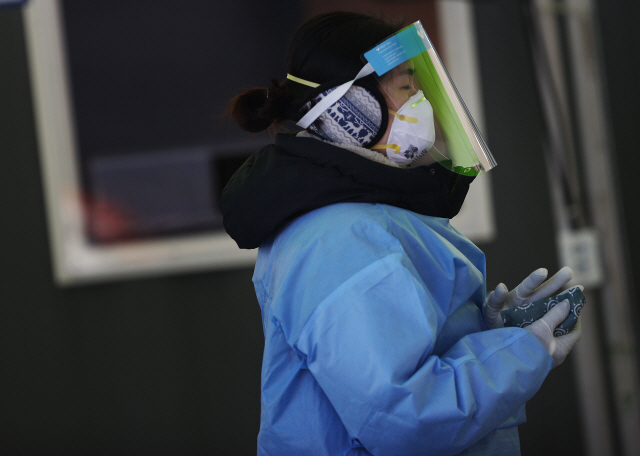 |
A medical worker warms her hands with instant hot packs at a makeshift clinic for coronavirus testing in front of Seoul Station on Sunday, amid a cold wave sweeping the country. (Yonhap) |
South Korea reached another bleak milestone in its battle against the coronavirus pandemic as its total COVID-19 caseload broke the 70,000 mark Wednesday, but health authorities said the winter wave showed signs of slowing down.
The virus, which was first reported in the central Chinese city of Wuhan in late 2019, has killed more than 1,100 people in South Korea.
New cases stood at 562 earlier in the day to raise the total to 70,212, surpassing the threshold 12 months after the nation's first confirmed case on Jan. 20 last year, according to the Korea Disease Control and Prevention Agency (KDCA).
South Korea had managed to bring the outbreak under control in the previous two waves, but the third wave, which began in late November last year, was particularly worrisome because it was quickly spreading in densely populated Seoul and neighboring areas.
It took only 13 days for the number to rise from 60,000 to top 70,000, marking the second-fastest pace of the pandemic in the nation.
Daily cases fell below 1,000 for the past week and have hovered around 500 this week, but cluster infections involving several senior care centers and a Seoul prison continued to emerge.
The daily number of cases first crossed 1,000 on Dec. 13 last year and hit a record high of 1,241 on Christmas Day, which was faster than authorities had expected.
The third wave of the pandemic has posed greater challenges to antivirus efforts, as sporadic infections in various community settings make it harder to trace their transmission routes compared with previous outbreaks.
The country faced its first wave of the outbreak tied to a church in the southeastern city of Daegu in late February and early March. The second wave gripped the country in late August in connection with a church in northern Seoul and an anti-government rally.
The transmission of the virus accelerated last month despite tougher restrictions, as the winter season provides a more favorable environment for viruses and weakens people's immune systems.
Supported by massive testing and tracking, health authorities said the third wave appeared to have peaked, but the nation should not be complacent.
"The COVID-19 pandemic is on the path toward a slow downturn, yet dangers of cluster infections on the community level still persist," Jeong Eun-kyeong, KDCA chief, said.
The country has enforced the Level 2.5 social distancing scheme in the greater Seoul area, which is the second highest in the country's five-tier scheme. Health authorities extended the measures until Jan. 17.
Private gatherings of five or more people are banned across the nation during the extended period.
Restaurants and high-risk entertainment venues, including bars, clubs and karaoke establishments, in the Seoul metropolitan area will be allowed to conditionally reopen when the current Level 2.5 measures expire.
Health authorities said they will decide whether to lower the level on the coming weekend.
Despite the downward trend, health officials have been vigilant against a new virus variant that was first reported in Britain.
The country has reported 16 variant cases. The authorities extended the ban on passenger flights departing from Britain until Jan. 21. (Yonhap)






![[Herald Interview] 'Trump will use tariffs as first line of defense for American manufacturing'](http://res.heraldm.com/phpwas/restmb_idxmake.php?idx=644&simg=/content/image/2024/11/26/20241126050017_0.jpg)
![[Exclusive] Hyundai Mobis eyes closer ties with BYD](http://res.heraldm.com/phpwas/restmb_idxmake.php?idx=644&simg=/content/image/2024/11/25/20241125050044_0.jpg)
![[Herald Review] 'Gangnam B-Side' combines social realism with masterful suspense, performance](http://res.heraldm.com/phpwas/restmb_idxmake.php?idx=644&simg=/content/image/2024/11/25/20241125050072_0.jpg)